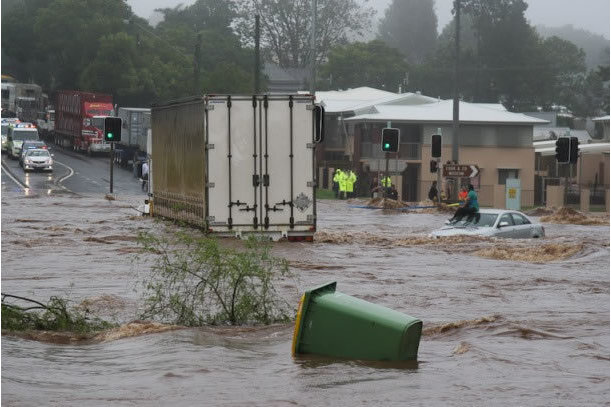Latest News
UN calls for urgent action to limit climate change catastrophe

News Highlight
A new report has called for unprecedented and urgent action within the next 12 years to limit global warming.
A new report by the Intergovernmental Panel on Climate Change (IPCC) has called for unprecedented and urgent action within the next 12 years to limit the devastating effects of global warming. Approved by the IPCC on Sunday, the report was authored by the world’s leading climate scientists from 40 countries.
Under the 2015 landmark agreement to combat climate change, also known as the Paris Agreement, nations set a goal of limiting increase in global average temperatures to 2 degrees Celsius (°C) or 3.6 degrees Fahrenheit (°F), although with the ambitions for a stricter limit of 1.5°C or 2.7°F of global temperatures. The UN then asked the IPCC to determine what the effects of global warming would be based on an increase of 2°C in warming, compared to 1.5°C and what it would take to achieve the lower limit.
The IPCC findings were published this week in a report titled "Global Warming of 1.5°C, an IPCC special report on the impacts of global warming of 1.5°C above pre-industrial levels and related global greenhouse gas emission pathways, in the context of strengthening the global response to the threat of climate change, sustainable development, and efforts to eradicate poverty." The 90 authors of the new report said they were shocked at seeing what a difference 0.5°C made on the planet.
The 700-page report shows that average global warming, if temperatures increase by 1.5°C, would be considered moderate. But a 2°C increase, the report warns, should be avoided to forestall some of the worst-case-scenarios of global warming.
“It’s very clear that half a degree matters,” said Valérie Masson-Delmotte, co-chair of IPCC Working Group I, at a press conference in South Korea, where the report was released.
The global mean temperature is currently at 1.2°C above pre-industrial levels. This level of warming has already led to extreme weather events such increased heat waves and increased intensity and frequency of precipitations.
In Nigeria, heavy rainfall recently caused flash floods and the overflow of Niger river, affecting several states, including Kogi, Niger, Delta and Anambra, with up to 600,000 people reportedly displaced. Increasing desertification in some parts of northern Nigeria and the contraction of Lake Chad have led to devastating impacts on farmlands and settlement areas.
The IPCC predicts an increase of global temperature to at least 4°C by the end of this century if enough mitigation actions are not taken early enough to reduce greenhouse gas (GHG) emissions going into the atmosphere. But even if countries were to meet their commitments under the Paris Agreement, temperature will still increase to 3°C above pre-industrial levels by the end of the century, according to the new scientific thinking.
Limiting global warming to – or below – 1.5°C as opposed to 2°C would reduce challenging impacts on ecosystems. For instance, the research shows that if warming is kept to 1.5°C, coral reefs will still decline by 70-90%. But if temperatures rise to 2°C, virtually all of the world's reefs would be lost.
Also, at 1.5°C, extreme heatwaves will be experienced by 14 percent of the world's population at least once every five years. But this figure will rise to more than a third of the planet if temperatures rise to 2°C. Also, at this magnitude of average temperature rise, half the habitat of insects, which are vital for pollination of crops, and plants will almost twice as likely be lost, compared with 1.5°C.
“Limiting warming to 1.5°C is possible within the laws of chemistry and physics but doing so would require unprecedented changes,” said Jim Skea, Co-Chair of IPCC Working Group III.
But to limit warming at the lower limit, which is now imperative, will require slashing carbon pollution by 45 percent by 2030, and reaching net zero by 2050. Under the earlier proposed 2°C pathway in the Paris Agreement, it was recommended that carbon pollution be cut by 20 percent by 2030 and zero carbon to achieved by 2075.
“Every extra bit of warming matters, especially since warming of 1.5°C or higher increases the risk associated with long-lasting or irreversible changes, such as the loss of some ecosystems,” said Hans-Otto Pörtner, Co-Chair of IPCC Working Group II.
Exceeding 1.5°C of warming, according to experts, will significantly worsen the risks of drought, floods, extreme heat and poverty for hundreds of millions of people. Malaria and dengue fever will be more widespread and the yields of staple crops like maize, rice and wheat will be smaller, particularly in sub-Saharan Africa.
World leaders have since been called upon to muster the moral and political will to reduce GHG emissions and save the world from the devastating impacts of climate change.
Related News
Latest Blogs
- What Ould Tah’s tenure at BADEA reveals about his AfDB candidacy
- Implementation strategy crucial for the success of 12-4 education policy
- A senator’s suspension threatens the right of representation
- Tinubu’s promising revolution in infrastructure development
- Has Tinubu’s economic reform started working?
Most Popular News
- Artificial intelligence can help to reduce youth unemployment in Africa – ...
- Nigeria records $6.83 billion balance of payments surplus in 2024
- Tinubu appoints new Board Chair, Group CEO for NNPC Limited
- Tariffs stir inflation fears in US but offer targeted industry gains ...
- Soaring civil unrest worries companies and insurers, says Allianz
- CBN net reserve hits $23.1 billion, the highest in three years









